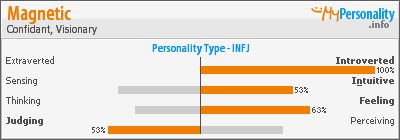
Introverts are often misunderstood; even by other introverts. As Laurie Helgo, PhD, points out in her book Introvert Power: Why Your Inner Life Is Your Hidden Strength, if you live in America, then you live in an extroverted society and introversion can often be looked at by society as a problem or short coming. If we turn down an invitation to a big party, people will often wonder 'What's wrong?' Or if we say we need to be alone for a while, everyone worries. It's also quite common for introverts to think about their answer before they throw it out there, and this sometimes earns us a false impression of being 'slow'. Dr. Helgoe is a Psychologist and fellow introvert, who has written a great book that will help dispel some of these misunderstandings, and encourage introverts to be comfortable with their introversion.
In Psychology, Introversion and Extroversion are defined as preferences, not conditions or traits. Dr. Helgo describes the Introvert preference this way: "Introverts generally prefer a rich inner life to an expansive social life; we would rather talk intimately with a close friend than share stories with a group; and we prefer to develop our ideas internally rather than interactively." (p. 4) Introverts also prefer sharing ideas, over small talk. And we recharge our batteries through quiet solitary activities such as book reading, walks, meditation, movies, or intimate conversation with plenty of time to pause and reflect. While big groups, and loud parties tend to exhaust us. An extrovert, by contrast, is energized by big parties, large groups of friends, and spirited fast paced conversations with topics running all over the map.
In a previous post I said that I would love to be an extrovert but after reading this book, I'm quite happy and content to stay the way that I am. I really do enjoy my introversion preference and will quit worrying that I'm missing out on something just because I don't enjoy a big get-together. Instead I'll focus on what I do enjoy -- family, smaller groups with just a few friends, books, and solitude.
Dr. Helgo's book is meant to educate both introverts and extroverts alike, and there is much more to the book than I've mentioned here. She wants everyone to know that being an introvert isn't a handicap; we aren't slow, we aren't snobs, we aren't unsocial or anti-social. We just process differently, and introverts have many strengths that we can bring to society. So be sure to give it a read if you want to get some ideas on how to carve out some needed quite space in your life, or if you want to understand the introvert in your life.
